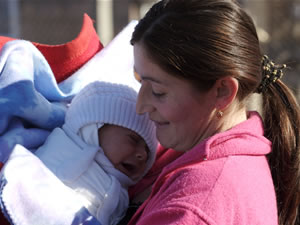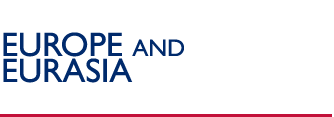Community Action Revives Health Care in Armenian Village
Voskepar is a small community of 1,200 inhabitants in Armenia’s Tavush marz region. Local lore says that what Voskepar lacks in size, it more than makes up for with determination. Hrush Aghbalyan, elected two years ago as the village’s mayor, embodies the determined character of her hometown—she is a woman with strong leadership skills and profound commitment to her community.
Aghbalyan has been passionate about improving the living standards of her village, especially the village’s sole health post. The roofless and unsafe edifice had been effectively defunct, as the local nurse was unable to deliver medical treatment under the existing unstable, unsanitary conditions.
When the mayor learned of the USAID Project NOVA’s Seed Funds Grant Program, she immediately thought of requesting funds to improve the healthcare facility. Project NOVA is a five-year program designed to improve reproductive, maternal and child health services in rural areas of Armenia. With 66 health posts renovated and over 1000 physicians and nurses trained in the north, the program currently covers about 170 healthcare facilities in five southern marzes of Armenia and serves over 250,000 people in rural communities.
 |
This woman and her child, along with their neighbors, are now able to receive healthcare services in Voskepar’s renovated health post
Photo Credit: Project NOVA |
Aghbalyan assembled an action group within the community to develop a budget and prepare a competitive proposal for the grant. The community’s concerted efforts were successful.
The news of winning the grant was received with joy and enthusiasm in the village. Aghbalyan wasted no time, and immediately mobilized the entire community for the reconstruction works, including her own office staff, and personally managed all the project activity.
“I was very concerned about the implementation process. My entire office was engaged in the project, installing water pipes, painting the ceiling and the walls. When we finished, we realized that the entrance was also in need of renovation. We didn’t want our women and children to enter the health post through an unattractive staircase and corridor. [To accomplish this,] the community then contributed an additional 100,000 drams which hadn’t been included in the budget,” the mayor said proudly. “We are very thankful to USAID and Project NOVA for the support. The community now has a strong belief in our internal resources and capabilities thanks to the Seed Grant Program. It was a very important exercise for all of us.”
Just as important as the upgrades in the physical structure, the community nurse, who had participated in NOVA’s Safe Motherhood Clinical Skills Training, received basic medical supplies and educational materials for the community. She is now anxious to provide primary medical services in the village and offer health consultations at the renovated post.
“We still have many other problems to solve in the community,” Aghbalyan admitted. “But we are now confident that we’ll be able to tackle those problems and implement our plans.”
Back to Top ^ |


